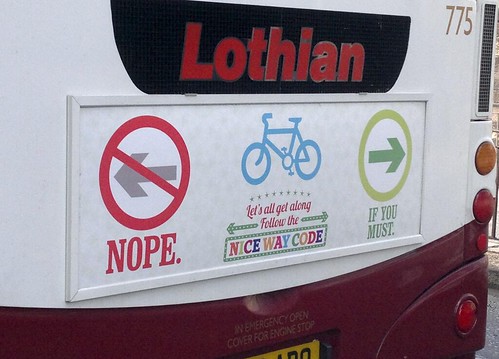EDIT: Beaten by chdot above, probably a better analysis!
It was interesting posting on Twitter last night about the ad on the back of the buses. A lot of people who cycle commented saying actually it was common sense, that you shouldn't go on the left, and that while 'if you must' could have been worded differently it amounted to the same thing as 'if it's safe'. I really thought this was spectacularly missing the point, but couldn't really put into words. But thought I'd try this morning with a little list.
1. Bus Stops
It was mentioned by many that passengers get on and off on the left of a bus, so it's not right to go up there. Surely this means you shouldn't go up the left of a bus when it's at a stop - whereas while stuck in traffic, if there's space, it should be fine? LRT are remarkably strict about not letting you on or off unless you're at a stop.
2. It's safer on the right
Undoubtedly often true, but not always. There isn't a blanket, 'it's always dangerous on the left, safe on the right' consideration. Sometimes it'll be safer and easier on the left, sometimes on the right. Everything boils down to the circumstances, and those circumstances may dictate that passing on the elft is the better option. The NWC advert doesn't allow for any of that subtle nuance of road use. Just 'NOPE' for passing on the left. Ever. Bus stopped in a queue that's not moving and a clear cycle lane to the left, don't use it. Instead, use it to go up the inside of cars, then when you reach the bus swerve round the back of it, to emerge blind 'if you must/if it's safe', then move back into the cycle lane once past. Repeat for each bus you come to.
3. Contradiction
Cycle lanes, and feeder lanes to ASLs, are put on the left by the powers that be. They tell us these lanes make for safer cycling (viz. the QBC). Motorists tell us to stay in them, and gripe that we don't use facilities when they're provided. Then we're told, actually, those lanes aren't safe, you better not use them to go past buses, and see where we painted a cycle lane that goes past a bus stop... Well... We were only joking. The worst thing about this aspect is that cycle lanes are most certainly the prime domain of the novice cyclist - because they've been told they're safe, and because they don't necessarily have the roadcraft yet to apply the nuances. Novice cyclist in the lane, told they have to go to the right of a bus thinks either, "Ooh, I don't like that, I think I might stop cycling if this lane is dangerous", or "I must be breaking a law here by going inside a bus."
4. Driver Psyche
So you're cycling along in a cycle lane. There's stationary traffic, a bus ahead, nowhere near a stop, you go past the bus, the world keeps turning. The motorist behind the bus thinks, "See those bloody cyclists,l always breaking the rules", the taxi driver tells his fare "I'll bet he goes through the red light ahead, just like on that advert, they all do it", and the bus driver thinks, "I've got a sign on my back telling cyclists not to go on the left, so I don't really need to check there anymore."
5. It's just plain wrong
So far the NWC ad campaign has said: cyclists aren't really people but more like animals; cyclists, stop doing things that annoy drivers, I mean, if you run a red light it really should be expected that a driver will shout at a completely different cyclist and assume that you all transgress in the same way; and cyclists, don't use the facilities we put in for you, and try not to pass buses if you can help it because the roads are a dangerous place even when we're telling everyone to be nice on them.
Essentially the bus ad is an admission by the NWC that telling people to be nice on the roads will change nothing because passing a bus on the left is suicidal and on the right is still pretty risky.
It would be interesting tow know the stats for Scotland on just how many cyclists had been injured going up the left side of buses at all, as well as how many were so injured going up the left while using a cycle lane.
NWC doesn't do subtlety or nuance. Or even correctly targeted campaigning.
Ramble over.


 posts
posts
